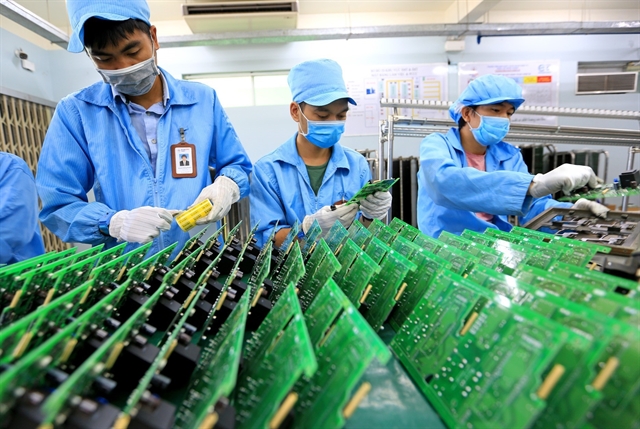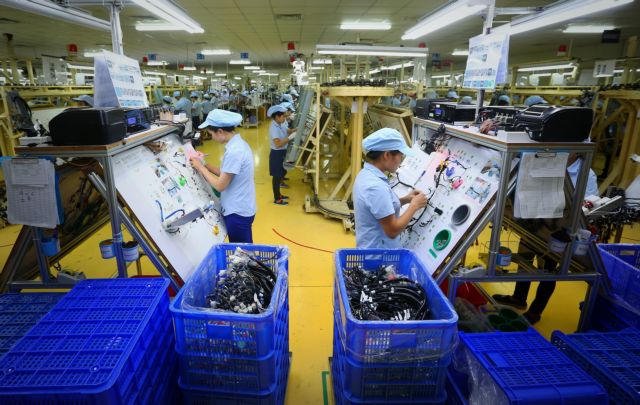Economist Nguyễn Trí Hiếu outlined political stability and security as important factors helping Việt Nam attract international investors in the electronics support industry.

HÀ NỘI — Việt Nam's electronics industry boom witnessed a remarkable boom in 2024, achieving an export turnover of US$126.5 billion, which accounted for one-third of the nation’s total export value, according to the General Statistics Office (GSO).
Of the total, electronics and components exports soared to $72.56 billion, marking a 27 per cent increase year-on-year. Meanwhile, exports of phones and components reached $53.9 billion, the GSO reported.
The key importers of Vietnamese electronics included the US, Europe, China and South Korea. Notably, the country’s exports of computers, electronic components and phones to Europe and America exceeded $56.9 billion, contributing nearly 45 per cent of the total export turnover.
Economist Nguyễn Trí Hiếu outlined political stability and security as important factors helping Việt Nam attract international investors in the electronics support industry.
In the context of trade tensions between the US and China, many businesses were looking for alternative production locations to minimise risks, and Việt Nam became a priority choice, Hiếu told daidoanket.vn.
Challenges persist for local electronics firms
Despite achieving significant export turnover, domestic electronics businesses continue to grapple with numerous challenges.
According to Đỗ Thị Thúy Hương, a representative from the Vietnam Electronic Industries Association (VEIA), most Vietnamese electronics companies are small and medium-sized enterprises. These firms face constraints in capital, technology and human resources.
In addition to these challenges, many domestic electronics businesses remain focused on processing and assembling activities.
These firms have yet to prioritise creating supply chains or investing in high-value segments like design, research and development, and distribution. This limited focus has constrained their ability to produce high-value-added products and achieve greater competitiveness in the global market, Hương told daidoanket.vn.

Mạc Quốc Anh, deputy chairman and general secretary of the Hanoi Association of Small and Medium Enterprises, emphasised the need for stronger links and partnerships with countries excelling in core industries, such as the US, Japan and South Korea, to address bottlenecks in Việt Nam's electronics sector.
He also urged the Government to establish clearer regulations on acquiring advanced science and technology transfers. Such measures, he noted, would enable businesses to access cutting-edge technologies more efficiently, enhance competitiveness and foster sustainable growth in the industry.
Economic expert Cấn Văn Lực advised Vietnamese electronics enterprises to align with global trade and investment trends, leveraging key partnerships and support policies, such as tax incentives and interest rate reductions, to advance digital transformation and circular business models. He highlighted the importance of using clean and local raw materials and fostering the growth of supporting industries.
Lực emphasised integrating sustainability into business strategies and called for diversification of markets, partners, supply chains, products and services. He also encouraged companies to secure feasible capital sources for green transformation, circular business practices and carbon credit initiatives, which he described as an irreversible global trend.
Lực also urged firms to proactively adopt cutting-edge technologies, such as artificial intelligence, virtual reality, automation, cloud computing and cybersecurity. By doing so, he said, businesses could participate more deeply in the global value chain and secure long-term growth opportunities.
According to the Ministry of Industry and Trade, Việt Nam's electronics sector has seen significant growth fuelled by favourable development conditions. The country's strategic location in a rapidly expanding and dynamic industrial region has played a key role in boosting the industry.
A large domestic market of over 100 million people, combined with direct access to the 600 million-strong ASEAN market and extensive export opportunities through participation in multiple free trade agreements (FTAs), has further supported the sector's expansion.
In 2025, the Ministry of Industry and Trade announced it will work closely with relevant agencies to implement stronger measures aimed at safeguarding Việt Nam's domestic electronics market. These efforts will include the implemention of defence taxes, technical barriers and stricter actions against trade fraud, counterfeit goods and smuggling activities. — VNS





